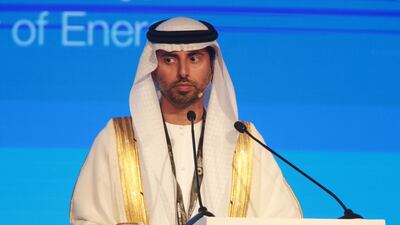Opec ministers sought to manage expectations in Algiers yesterday as they worked towards some kind of compromise to assuage the oil market.
While there was little expectation from oil analysts that the major producers would agree a concrete deal to curb output, the ministers who gathered in the Algerian capital, ostensibly for an informal meeting while attending another conference, were working on a communiqué that would indicate their willingness to take action if required.
The UAE’s energy minister, Suhail Al Mazrouei, who for the past two years has backed Saudi Arabia’s policy to let the market find its own equilibrium, repeated the UAE’s position that it would support any broad, coordinated effort to limit supply, noting the “efforts exerted by the Gulf Arab states in Opec to gather opinions and unify ranks to help the oil market toward an early recovery”.
The minister said that “if all members of Opec are in agreement around a decision, I think there is a high likelihood of getting support of the others, especially Russia … We think a freeze will help if it is agreed [and] we hope that all are going to agree.”
One of the barriers to a deal has been Iran’s reluctance to join any commitment to curb output until it reaches the 4 million barrels per day production level it enjoyed before nuclear-related sanctions were introduced in 2012. Since those sanctions were lifted this year, output had risen by about 600,000 barrels per day to 3.6 million bpd in August, according to Opec’s latest report this month.
In the lead-up to the Algiers meeting, Saudi Arabia let it be known that it would agree an output freeze if Iran held its output at August levels. But Iranian oil officials say output already is well above that, at 3.8 million bpd, and headed to 4 million bpd by the end of the year.
An indication of Iran’s determination to reclaim its market share was a deal last week with India to sell it 6 million barrels for its strategic reserve.
China, the other key growth market for crude exporters, has been another battleground this year between Iran and Saudi Arabia, although it is Russia that has won most China share from Saudi Arabia over the past several years. Thus, Russia and Saudi Arabia reached an agreement at the China G20 meeting to form a working group to study oil stabilisation efforts. Some market observers have seen that as a precursor of something more substantial down the road, although Russia has never previously joined any output-curbing efforts even when it has voiced support for them.
With the Saudi oil minister, Khalid Al Falih, going into Algiers pointing to progress in the balancing of the world oil market while also reiterating Saudi Arabia’s openness to a deal if all agree, the most likely outcome may be a communiqué that agrees to work on an output-curbing deal at a later date, perhaps the November 30 regularly scheduled Opec ministers’ meeting.
Such a deal could make commitments based on how the market progresses. As Francisco Blanch, the head of commodities research at Bank of America Merrill Lynch, said yesterday, there is a high degree of uncertainty about how things may go over the next year or so, depending on supply recovery in places including Nigeria and Libya, and decline in others, such as Venezuela, Brazil and the US shale oilfields.
“We see global oil supply increasing by a small 230,000 bpd year-on-year in 2017 as declines from non-Opec producers should partly offset output gains from the cartel,” Mr Blanch said. “Meanwhile, global demand is set to increase by 1.2 million bpd, resulting in a shift from a global surplus of 180,000 bpd this year to an average global deficit of 780,000 bpd next year.”
If that happens then oil prices should continue to recover – to the upper US$60s per barrel, Mr Blanch’s bank estimates – and help support Saudi’s status quo approach. But a deal with other producers to act in the event supply is much higher could help to underpin the market.
A barrel of Brent crude was trading late yesterday for $47.40, a gain of 3.2 per cent on the day.
amcauley@thenational.ae
Follow The National's Business section on Twitter

